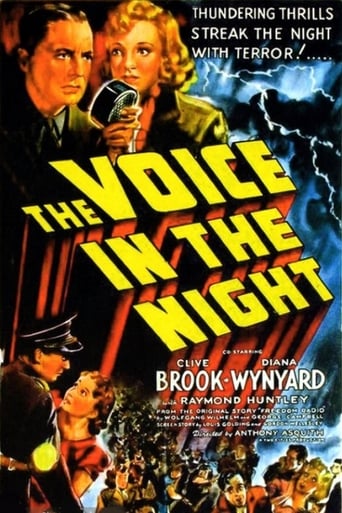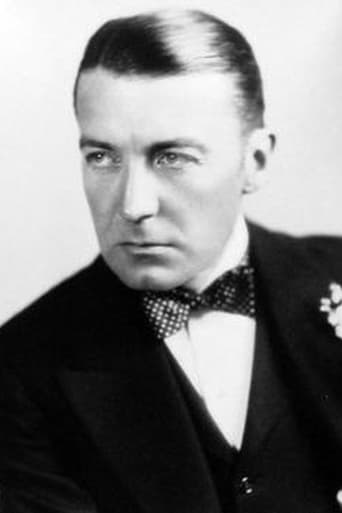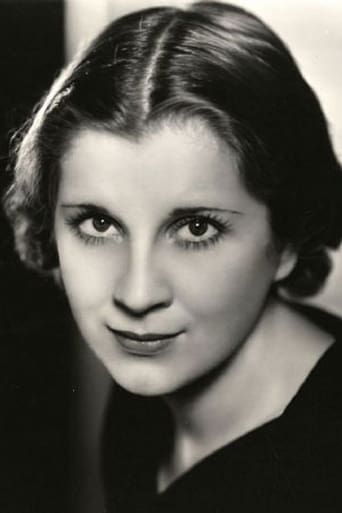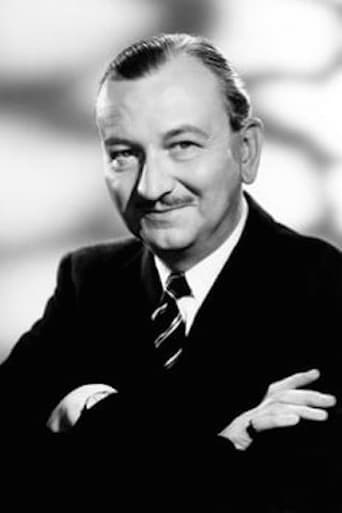

Freedom Radio (1941)
Hitler's doctor is gradually realising that the Nazi regime isn't as good as it pretends to be when his friends start to "disappear" into the camps. His wife is courted by the party and accepts a political post in Berlin. Meanwhile Dr Karl decides to try to do something to counteract the Nazi propaganda and with the help of an engineer and a few friends he sets up the Freedom Radio to counteract the Nazi propaganda.
Watch Trailer
Cast


Reviews
The film creates a perfect balance between action and depth of basic needs, in the midst of an infertile atmosphere.
I didn’t really have many expectations going into the movie (good or bad), but I actually really enjoyed it. I really liked the characters and the banter between them.
There are moments in this movie where the great movie it could've been peek out... They're fleeting, here, but they're worth savoring, and they happen often enough to make it worth your while.
The movie turns out to be a little better than the average. Starting from a romantic formula often seen in the cinema, it ends in the most predictable (and somewhat bland) way.
Tim McCoy (Tim Dale), Billie Seward (Barbara), Joseph Crehan (Robinson), Ward Bond (Bob), Kane Richmond (Jack), Frank Layton (Matthews), Guy Usher (Benton), Francis McDonald (Jackson), Alphonse Ethier (W.T. Dale).Director: CHARLES C. COLEMAN. Screennplay: Harold Shumate. Photography: John S. Stumar. Film editor: John Rawlins. Western Electric Sound System. Copyright 24 March 1934 by Columbia Pictures Corp. No recorded New York opening. Australian release through Greater A.F.: 7 November 1934. 6 reels. SYNOPSIS: "Dedicated to that fighting legion without which a nation cannot exist-those unsung heoes of the storm: the telephone men!"COMMENT: High-speed car chases, a fight on a cable car, plus the dynamiting of a swollen river, all add up to plenty of fast-moving excitement for Tim McCoy fans. The support cast is solid too. I could list them one by one, but will content myself by listing Ward Bond, Joseph Crehan, and the most enticing Billie Seward.Technical credits are likewise admirably professional.
FREEDOM RADIO (AKA "A Voice in the Night") 1941This production is an early WW2 British propaganda film set just before the start of the war.Clive Brook plays a doctor who just happens to be on of Adolf Hitler's personal medical team. Brook is married to a successful stage actress, Diana Wynard. Also in the mix here is Wynard's brother, John Penrose, and Gestapo man, Raymond Huntley.The Nazi Party has been in control for 6 years and the country is falling deeper under Hitler's grip. Brook and a group of friends from his school days meet for drinks every couple of weeks. It seems that every meeting there are fewer and fewer friends showing up. The men are running afoul of various Government edicts and are ending up in the camps. Brook is growing more annoyed with the direction Germany is going.Matters come to a head when his priest friend, Morland Graham is killed while being arrested. One of the SS types making the arrest was his wife, Wynard's brother, John Penrose. Brook has had enough and decides to set up a resistance group.The small group of close friends and like-minded types set up a mobile radio broadcaster. They use this to hit the airwaves spreading the truth on the Nazi machine. The Gestapo types are increasingly hot under the collar over their inability to catch the "Freedom Radio" crew.The main reason that they can stay ahead of the Nazis, is that their radio is onboard a small motor launch. They are always on the move which prevents the Gestapo from getting a radio position fix. The group pulls a big move and sabotage one of Hitler's speeches. This however results in the death of one of the group.Brook's wife, Wynard, is flattered by the attentions of the Party and accepts a political appointment. She cannot understand Brook's growing dislike of the regime.The Gestapo pulls out all the stops and finally corners Brook and Wynard, who has now joined her husband. The two are shot dead and the end of the "Freedom Radio" is announced over the airwaves. The surviving members of the group are however soon back on the air continuing the struggle.This quite watchable film was put out when the British were still for the most part, on the losing end of the conflict. The acting is acceptable, though Brook is a tad too stiff lipped for me. He always reminded me of the British version of American actor, Richard Dix.Worth a look if you can find it.
Recently Film Four in the UK has been screening vintage British films from the 30s and 40s and this entry directed by Puffin Asquith demonstrates just how superior his early work was compared with that of Carol Reed. Reed in fact tackled a similar subject to this the year previously but his Night Train To Munich is light years away from Freedom Radio which is never risible. Okay, they had ten writers on the project and a leading man and leading lady who today would seem mannered in the extreme but they were surrounded by excellent supporting players such as Raymond Huntley, Ronald Squire, Martita Hunt, Bernard Miles and Katie Johnson, so memorable some fifteen years later in the original The Ladykillers. Reed's screenplay had nothing, for example, to compare with Ronald Squire's droll comeback when asked how he enjoyed his recent trip to America 'I didn't go to America, I went to New York'. Clive Brook manages to personify decency and the outrage felt by ordinary Germans at what they observed going on around them - again Puffin employs a crisp economical montage involving boutonnieres that disappear one by one as do their owners. A fine effort.
This is the sort of intelligent movie you simply won't meet with in modern cinema. Yes, it's blatant propaganda, and yet the film serves so much more as a clarion call for justice, civility, and yes, freedom too. What we have in the lead character, Dr. Roder has got to be one of the most real, most believable and admirable heroes in of cinema.My advice is don't get bogged down with the occasional stuffiness of the production, enjoy this exultation on the bravery inside those who are able to stand up for what they believe in.It's a shame Freedom Radio will only ever get seldom showings on obscure channels in the mid-afternoon. This is the sort of film we'd do well to show in history classes.




